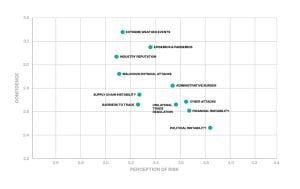ICS Maritime Barometer Report 2022-2023
The ICS Maritime Barometer is the first full-scale annual survey of risk and confidence among maritime leaders.
More than 130 decision makers, half of them shipowners and around 35% consisting of ship managers, have provided insight into the issues preoccupying them and how they are placed to manage their impact. It captures data on the following:
- What are the biggest challenges and opportunities facing the maritime sector today?
- How is the risk profile of the maritime sector evolving?
- How confident are companies in mitigating long term and emerging issues?
Over the past year, maritime has proven its ability to maintain trade ongoing post-pandemic challenges, and concerns have shifted towards growing global instability, as well as wider societal trends, including a greater focus on decarbonisation and sustainable business practices. Maritime leaders’ assessments of risk levels for industry factors (ranging from political and supply chain instability to barriers to trade) and their confidence to manage these factors have demonstrated just how much the operating landscape has changed over the past year.
The report is divided into two main sections:
Top risks for maritime leaders – from political instability to industry reputation, how the C-Suite views the threats and capabilities around key issues.
Decarbonisation, fuels and emissions – a deep dive on attitudes to the many concerns on climate dominating industry discussion, from fuel choice to funding.

Top risks for maritime leaders

Top risks identified were political instability, financial instability and cyber-attacks. As financial and political risk has risen, particularly due to the ongoing conflict in Ukraine, so too have concerns about companies’ capabilities to manage such issues. A key takeaway for this year is that although some risks hold the potential to have a serious impact on operations, maritime leaders have high confidence in the industry’s abilities to manage these situations.
Emerging considerations include delivering a Just Transition to address maritime decarbonisation’s impact on seafarers and ensure they are provided with adequate training for the use of new fuels and technologies.
Decarbonisation, fuels and emissions

Respondents shared their views on decarbonisation factors, highlighting a maturing of the industry’s understanding of the complex implications of the energy transition. While the practical consequences of new GHG reduction regulations have continued to be the biggest concern.
Investor requirements and carbon pricing measures were also seen as high impacting issues, although C-Suite respondents to the survey felt significant confidence in their ability to address these issues. This could be the result of expected lengthy planning and implementation periods, allowing stakeholders a reasonable period to respond to such measures. While some investor requirements have led to growing prioritisation of Environmental, Social and Governance (ESG) measures, maritime industry discussion on data gathering methodology, assessment and overview is ongoing, offering stakeholders time to plan accordingly for the future.


